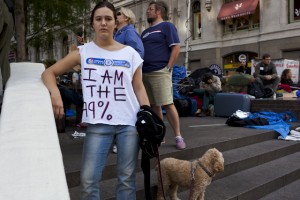Late last week, Occupy Wall Street protesters across the country marched through cities and clashed with police as part of a “Day of Action.” New York protesters even brought the infamous drum circle (which drew anger from protesters and residents alike before the Occupy Wall Street protesters were evicted from Zuccotti Park last Tuesday) to Mayor Michael Bloomberg’s Upper East Side mansion. The “Day of Action” marked the 2-month anniversary of the Occupy Wall Street movement, which highlighted issues of economic inequality and fairness.
The question is: will Occupy Wall Street have the same impact on American politics as the Tea Party, which had a significant influence on the 2010 midterm elections? The November PRRI/RNS Religion News Survey found that equal numbers of Americans believe that the Occupy Wall Street and Tea Party movements share their values – but the current level of affinity Americans have for these two very different movements may represent the ceiling for the Tea Party and the floor for Occupy Wall Street.
First of all, ideas at the heart of the Occupy Wall Street movement – economic inequality and fairness – resonate strongly with most Americans:
- Two-thirds of Americans believe the government should do more to reduce the gap between rich and poor, and an equal number say that it is fair to ask wealthier Americans to pay a higher percentage of their incomes in taxes to reduce the deficit.
- There is also little public support for cutting federal funding for social programs that help the poor, while increasing taxes on corporations and the wealthy remain widely popular.
Second, despite this broad-based support for the Occupy Wall Street movement’s core issues, the Democratic Party has yet to fully embrace OWS in the same way that the Republican Party has embraced the Tea Party. A strong majority of rank-and-file Republicans (59%) report that the Tea Party movement shares their values, compared to only 4-in-10 Democrats. If more Democratic politicians actively support OWS it is likely that rank-and-file Democrats will respond.
It’s too early to tell whether the issue of economic inequality will feature prominently in the 2012 election, however there is evidence that the issue is already affecting the Republican primary race. Defending his decision to endorse Newt Gingrich, the publisher of the New Hampshire Union Leader explained: “I think it’s going to be Obama’s 99% versus the 1%, and Romney sort of represents the 1%.” But the Democratic Party may need to take the lead before the issues raised by Occupy Wall Street can have a lasting impact on the country’s political culture.
